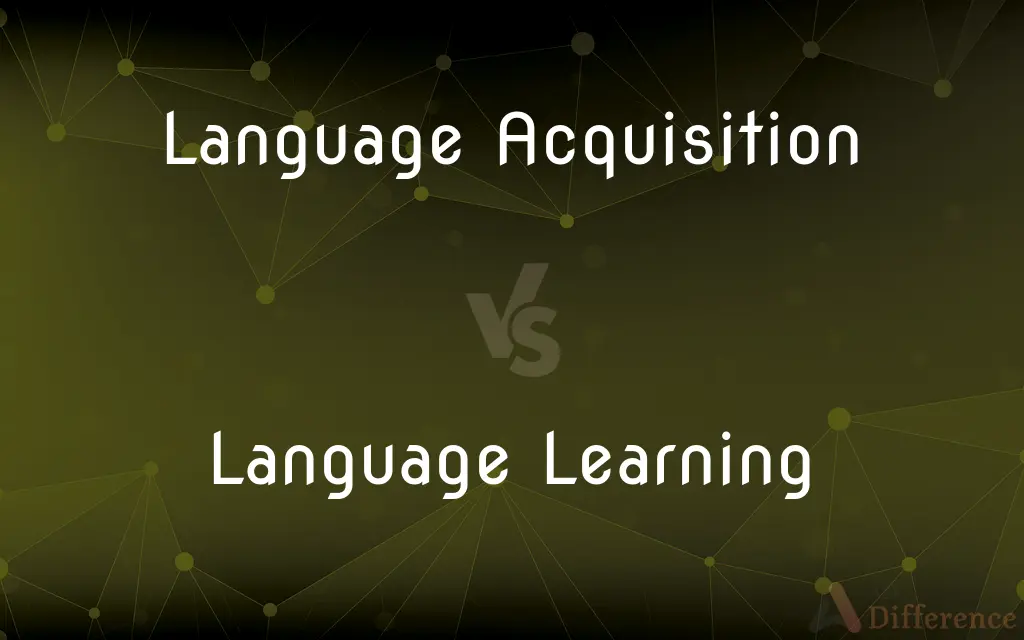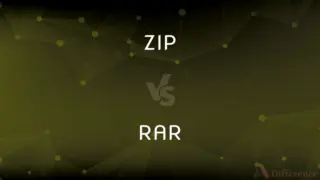Language Acquisition vs. Language Learning — What's the Difference?
Edited by Tayyaba Rehman — By Fiza Rafique — Published on October 16, 2023
Language Acquisition is the subconscious process of gaining language naturally, while Language Learning is the conscious study and practice of a language.

Difference Between Language Acquisition and Language Learning
Table of Contents
ADVERTISEMENT
Key Differences
Language Acquisition refers to the intuitive process, usually occurring in early childhood, where individuals pick up a language through immersion and exposure without formal instruction. Language Learning, however, denotes the deliberate effort one puts into studying a language, often involving classes, grammar exercises, and vocabulary memorization.
In Language Acquisition, children effortlessly grasp linguistic structures, pronunciation, and vocabulary from their surroundings, showcasing the innate human ability to absorb language. In contrast, Language Learning involves a more analytical approach, where learners consciously tackle grammar rules, practice pronunciation, and expand their lexicon.
Language Acquisition typically results in native-like fluency without explicit awareness of grammatical rules. This process, driven by the need to communicate, doesn't rely on textbooks or lessons. Language Learning, on the other hand, often revolves around academic or structured settings, aiming to impart linguistic knowledge in a methodical manner.
While both Language Acquisition and Language Learning lead to proficiency in a language, the paths they take vary significantly. Language Acquisition thrives on immersion and natural interaction, mirroring the way most people learn their first language. Conversely, Language Learning leans on structured resources, lessons, and dedicated practice, mirroring the way many learn a second or third language.
Language acquisition and language learning represent two different approaches to mastering a language. Language acquisition is a subconscious process, typically observed in children who pick up their native languages without formal instruction. As children hear spoken language around them, they internalize its structures and patterns naturally.
ADVERTISEMENT
On the other hand, language learning refers to a more conscious effort to learn a language. This often involves structured lessons, grammar rules, vocabulary lists, and deliberate practice. Language learning is commonly associated with classroom environments and is how many people study second or foreign languages.
An analogy can be made between these two processes and how we learn to swim. Language acquisition is like learning to swim by being thrown into the water and adapting naturally. Language learning, in contrast, is like taking formal swimming lessons, with specific techniques and practices.
The lines between language acquisition and language learning can sometimes blur, especially in immersive environments. For instance, someone might start with structured language lessons (language learning) and then move to a country where the language is spoken, gradually picking it up more naturally (language acquisition).
Comparison Chart
Process
Subconscious and intuitive.
Conscious and structured.
Setting
Natural immersion and interaction.
Academic or formal classes.
Age Factor
Predominantly occurs in early childhood.
Can happen at any age.
Focus
Communication and natural usage.
Grammar, vocabulary, and rules.
Outcome
Native-like fluency without explicit grammar.
Proficiency with understanding of grammar.
Nature
Subconscious and natural.
Conscious and structured.
Typical Age
Often observed in childhood.
Common in older children and adults.
Environment
Typically occurs in natural settings.
Often occurs in classrooms or formal lessons.
Result
Native-like fluency and pronunciation.
Understanding of formal structures and grammar.
Compare with Definitions
Language Acquisition
The subconscious assimilation of a language through immersion.
Her perfect accent was due to Language Acquisition from living abroad as a child.
Language Learning
Understanding a language via structured lessons and exercises.
Many adults engage in Language Learning to add a new language to their skillset.
Language Acquisition
The subconscious process of internalizing a language without formal instruction.
Children demonstrate language acquisition as they pick up their native tongue from their environment.
Language Learning
Acquiring linguistic skills through formal education.
Duolingo and Rosetta Stone are popular tools for Language Learning.
Language Acquisition
Absorbing a language by mere exposure and interaction.
Growing up in a bilingual household facilitates Language Acquisition.
Language Learning
Actively studying a language through resources and courses.
Online platforms have made Language Learning more accessible and flexible.
Language Acquisition
Gaining language skills without formal instruction.
Children demonstrate Language Acquisition when they mimic what they hear.
Language Learning
The conscious effort to learn a language through study and practice.
He started language learning later in life, taking Spanish classes at his local community college.
Language Acquisition
The effortless grasp of linguistic structures from exposure.
Living in Italy, he experienced Language Acquisition and soon spoke fluently.
Language Learning
The academic approach to mastering a language's formal structures.
Traditional classrooms employ textbooks and drills in language learning.
Language Acquisition
Gaining language skills naturally, typically in early childhood.
Her bilingual home sped up her language acquisition in both English and Spanish.
Language Learning
The methodical approach to mastering grammar, vocabulary, and pronunciation.
She enrolled in a school for Language Learning to improve her Spanish.
Language Acquisition
The innate process of absorbing language naturally.
Through Language Acquisition, babies start recognizing speech patterns.
Language Learning
The deliberate study and practice of a language.
He took up Language Learning to master Japanese for his job.
Language Acquisition
The process by which people acquire their first language(s) without deliberate teaching.
Infants' cries and babbling are initial stages of language acquisition.
Language Learning
Gaining language skills through structured lessons and exercises.
Online platforms have revolutionized language learning with interactive exercises.
Language Acquisition
Absorbing language structures and patterns without conscious effort.
By listening to the conversations around him, his language acquisition process was seamless.
Language Learning
Studying vocabulary, grammar, and pronunciation deliberately.
Her focus on language learning led her to master three foreign languages.
Language Acquisition
The innate human capability to learn language organically.
Researchers study language acquisition to understand how the brain processes linguistic information.
Language Learning
Actively seeking to understand and use a new language.
She combined language learning apps with conversation practice to enhance her fluency.
Common Curiosities
Why do children seem to acquire languages more easily?
Children are more receptive and adaptive, making Language Acquisition more intuitive for them.
What is Language Acquisition?
Language Acquisition is the subconscious and natural process of gaining a language through immersion and exposure.
How does Language Learning differ from Language Acquisition?
Language Learning is the conscious study of a language, while Language Acquisition happens intuitively without formal study.
How can I enhance my Language Learning experience?
Using multimedia resources, practicing with native speakers, and consistent study can boost Language Learning.
Can Language Learning benefit from Language Acquisition methods?
Absolutely. Combining structured Language Learning with immersive Language Acquisition techniques often yields the best results.
Can adults engage in Language Learning?
Yes, adults can participate in Language Learning at any age through courses, tools, or self-study.
Does Language Learning always require classes?
No, Language Learning can occur through self-study, online tools, books, and various other resources.
Can Language Acquisition lead to fluency?
Yes, Language Acquisition often results in native-like fluency, especially when it occurs at a young age.
Is immersion the key to Language Acquisition?
Immersion significantly facilitates Language Acquisition as it provides constant exposure and practice.
Does Language Learning guarantee fluency?
Not necessarily. Fluency in Language Learning depends on the effort, practice, and immersion of the learner.
Is Language Acquisition limited to childhood?
While most pronounced in early childhood, Language Acquisition can occur at any age but is generally more effortless in younger individuals.
Why is natural interaction vital for Language Acquisition?
Natural interaction in Language Acquisition allows for real-world practice, reinforcing linguistic structures and vocabulary.
Is language acquisition only for children?
While it's most common in children, adults can also experience language acquisition in immersive environments.
Can I combine both methods?
Absolutely! Many people start with language learning and then immerse themselves for acquisition-like experiences.
Why is pronunciation often better with language acquisition?
Natural exposure and mimicking native sounds lead to more authentic pronunciation.
How do schools typically approach language teaching?
Most academic settings lean towards language learning with structured lessons.
Are there tools to aid in Language Acquisition?
While tools typically assist in Language Learning, immersive tools like movies or music in the target language can support Language Acquisition.
Can language learning lead to fluency?
Yes, with consistent practice and exposure, language learning can lead to fluency.
Can I achieve language acquisition through travel?
Immersing yourself in a country where the language is spoken can stimulate language acquisition.
Is one method better than the other?
Both have merits; language acquisition often leads to native-like fluency, while language learning offers structured understanding.
Can adults achieve language acquisition?
It's rarer, but adults in immersive linguistic environments can experience aspects of language acquisition.
Is understanding grammar essential for Language Learning?
While it's beneficial, many learners achieve proficiency in Language Learning without mastering all grammar nuances.
Do all children undergo Language Acquisition in the same way?
While the process is similar, the pace and style of Language Acquisition can vary among children based on exposure, environment, and individual traits.
Why do children acquire languages easily?
Their brains are more plastic and adaptable, making language acquisition more natural for them.
How long does language learning typically take?
It varies based on the language, learner's dedication, and resources, but structured practice accelerates it.
Is language acquisition only about speaking?
No, it involves understanding, speaking, and often reading and writing as well.
Does language learning always need a teacher?
While beneficial, self-study and technology can also facilitate language learning.
Why do some people prefer language learning over acquisition?
It offers a structured approach, clear milestones, and an understanding of grammar rules.
Can I achieve language learning online?
Definitely! Many platforms and resources cater to online language learning.
Share Your Discovery

Previous Comparison
ZIP vs. RAR
Next Comparison
Carbohydrates vs. LipidsAuthor Spotlight
Written by
Fiza RafiqueFiza Rafique is a skilled content writer at AskDifference.com, where she meticulously refines and enhances written pieces. Drawing from her vast editorial expertise, Fiza ensures clarity, accuracy, and precision in every article. Passionate about language, she continually seeks to elevate the quality of content for readers worldwide.
Edited by
Tayyaba RehmanTayyaba Rehman is a distinguished writer, currently serving as a primary contributor to askdifference.com. As a researcher in semantics and etymology, Tayyaba's passion for the complexity of languages and their distinctions has found a perfect home on the platform. Tayyaba delves into the intricacies of language, distinguishing between commonly confused words and phrases, thereby providing clarity for readers worldwide.
















































